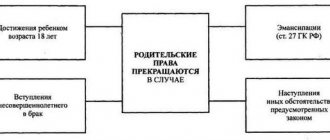The traditional concept of family includes mutual support, respect and love between parents and children. The behavior of the father and mother, being an example for the child, shapes his personality and largely determines his future life. Unfortunately, the lifestyle of some parents, their moral principles and methods of education are not always safe for children. The state bears the responsibility to protect family values by regulating certain aspects of the relationship between the child and his parents. Today we will talk about how to return a child, what is the procedure for restoring parental rights.
The Family Code of the Russian Federation is a fundamental normative act in the field of family law, which establishes, among other things, the procedure for depriving a mother and (or) father of parental rights, as well as the return of parental rights to parents.
Procedure for restoration of parental rights
To restore parental rights, it is necessary to confidently and clearly adhere to that internal ideology when the parent realizes full responsibility for the children. At the same time, it is important to convince the court itself of its intentions. Let's look at step-by-step instructions on how to regain parental rights.
- Statement of claim . For this step, you need to file a lawsuit in court, which will describe in detail all the circumstances, the petition - what exactly you want. It is necessary to correctly formulate your goal in order to correctly resolve the outcome of the case.
- Proof . It is necessary to collect and present evidence of your intentions. That is, one of the main documents is medical certificates from psychiatry, from narcology, from an ordinary clinic. All certificates must be completely positive in the sense that the court will pay attention to sane people.
- The court's decision . The final stage of the restoration order is a court decision in full. This will describe whether the claims were satisfied or not and for what reason. Next, a writ of execution is obtained from the bailiff service.
- Execution of a court decision
What does judicial practice say?
The court, in addition to examining the circumstances of the case, pays attention to the behavior of mom or dad in court, interest in this issue - participation or ignoring subpoenas.
In judicial practice, there are cases when the parent, according to all written evidence, seemed positive and changed, that is, capable of raising his child. However, during the trial he behaved aggressively, disrespectfully toward the court participants, and impatiently, which indicated the opposite and contradicted his characteristics. The court, based on the interests of the child, considers it impossible to transfer the minor to such a parent.
If during the trial it becomes obvious that the parent(s) are constantly changing their place of residence, work, not having their own home, appearing in public places while intoxicated or not fully overcoming harmful addictions, and also if correct behavior is not long-term (sustainable) character - restoration of parental rights will be denied.
If a parent has been deprived of their rights due to violent actions taken against a minor, threats of murder, infliction of bodily harm, or acts of a sexual nature towards a child, it will not be possible to return the rights. The court will refuse, even if numerous evidence of a change for the better is presented.
Documents for restoration of parental rights
There are no bodies that operate without documents. Therefore, when restoring parental rights, you must submit the following list of documents to confirm your intentions:
- Characteristics from the place of work;
- Certificate from a narcologist;
- Certificate from a psychotherapist;
- Certificate from a local doctor;
- Certificate of presence or absence of criminal record;
- Certificate of income;
- Ownership documents;
- Certificate of payment of alimony;
- Certificate of visits to a child in a boarding school.
Naturally, this list is not exhaustive, so it can be doubled. The main thing for the court is to attach as many documents as possible in order to positively assess the outcome of the case.
USEFUL: watch the video and you will find out why Clients choose our organization as their assistant, write your question in the comments of the video and receive FREE legal advice on any issue
What documents will the court require?
Presenting evidence that can convince the court to correct an unscrupulous parent is a primary task. The court will rely primarily on the documents filed and will also hear the parties and witness testimony.
The evidence base for restoring rights to a child consists of:
- documents;
- testimony.
The following must be attached to the statement of claim:
- Certificates of payment of alimony and absence of debts.
- Documents confirming completion of a course of treatment in the relevant medical institutions (PND or drug dispensary).
- Certificates from work about earnings.
- Documents about the living conditions that the parent is able to provide.
Non-documentary evidence is most often presented directly during meetings - witness testimony, speeches of experts, specialists.
In addition to the evidence base, a mandatory list of papers is attached to the claim:
- Personal documents of the plaintiff.
- A copy of the writ of execution on the basis of which the minor was removed from the family.
- Documents confirming the payment of alimony, other evidence confirming the correction of the situation.
The more evidence is presented to the court, the higher the chances of a positive outcome of the proceedings. At its discretion, the court decides to attach or refuse to attach the proposed documents to the case.
Grounds for restoration of parental rights
After reading Article 72 of the Family Code of the Russian Federation, you will be able to understand how and in what cases parental rights can be restored.
The parent in respect of whom a decision was made to terminate the rights to the child restores his or her parental rights. In this case, simultaneously with the request for restoration of parental rights, the applicant may ask the court to make a decision on the return of the child if he was taken away as a result of deprivation of parental rights.
For a positive decision, it is important to take into account the following conditions for the restoration of parental rights:
- The interests of the child are the most important thing, because The reasons for imposing sanctions against “negligent parents” are related to this issue. If the child is ten years old, his opinions are taken into account and his consent is asked.
- the parent who was deprived of parental rights completely managed to change his behavior;
- the parent’s lifestyle has changed in such a way that he can provide his child with proper upbringing and development;
- The parent's attitude towards the methods of raising the child has improved.
Paternity restoration procedure
Only a court can restore parental rights, so you will definitely have to file a lawsuit and a package of documents.
The plaintiff may be:
- Father.
- Father at the same time as mother.
The defendant is the organization or citizen under whose guardianship the child is, namely:
- Mother.
- Trustee or guardian.
- The institution where the child is located (boarding school, hospital, shelter, orphanage).
- Municipal guardianship authority.
The court makes a decision after studying all the circumstances of the case and taking into account the interests of the child.
How to correctly write a statement of claim for restoration of parental rights?
The case is considered by the district court at the place of official registration of the defendant - the child’s guardian, second parent or child care institution where the minor is located. The court also considers other legal family disputes between citizens.
The statement of claim for restoration of parental rights must contain a requirement that if a positive decision is made, the other party is obliged to hand over the child to you. As part of the trial, protection of the child’s property rights can be provided so that his property is not threatened.
The statement of claim contains the following information:
- personal data of the plaintiff;
- reason for deprivation of rights;
- the grounds on which rights should be restored;
- evidence of your position.
Before attending court, you must pay a visit to the guardianship authorities. Its representatives accept the application, conduct a study of the living conditions of such a parent deprived of rights, visit the child with his guardians or in the government institution where he resides. The corresponding conclusion of the authorities is also used during court hearings.
No state fee is charged when filing such an application.
Our child rights lawyer may be summoned to court for a more thorough consideration of the case.
Features of the procedure
Before making a request to the court, the plaintiff must wait 6 months after the deprivation, during which the application will simply not be accepted, and also carefully consider the evidence that will help justify the court’s readiness to accept parental authority in relation to the ward. It is necessary to prove that the adult will be able to perform all the duties established by law after the right is restored.
After the court makes a decision to satisfy the plaintiff’s demands, at least a month must pass, since the law allows for the possibility of challenging the decision within 30 days.
Sequence of steps
To become a parent again, a court procedure is carried out, since only the court has the authority to decide serious issues related to the rights of children. Citizens apply to the district court at the place of residence of the child or the defendant, having previously prepared for the consideration of the case and secured documentary evidence.
The complete recovery procedure is as follows:
- Collection of documents and preparation of evidence demonstrating the person’s correction and reconsideration of his/her attitude towards his/her responsibilities. Verification of the fulfillment of all conditions under which the law allows the return of a minor - living conditions, financial support, lifestyle and behavior of the plaintiff.
- Preparing a claim.
- Consideration of the application by the court and making a decision on the appointment of proceedings.
- Notifying all interested parties about the date of the meeting.
- Holding meetings during which the possibility of returning powers is established.
- If the claims are satisfied after the court decision has entered into force, they will organize its execution and correction of documents for the child.
The defendant in a claim for a minor is the organization or person who has assumed responsibility for the child after deprivation of paternity or maternity:
- second parent;
- guardians;
- Orphanage.
The place of filing the claim is the district court where the child is located. In the future, at meetings it is necessary to ensure the presence of guardianship representatives at the district administration at the place of residence of the ward. The powers of guardianship include inspection of living conditions and opportunities for support on the part of the deprived parent. A representative of the prosecutor's office has the right to speak in court.
Actions after a court order
Merely having a document from the court confirming the satisfaction of the claims is not enough. After the verdict comes into force, the judges contact the local civil registry office to correct the entry in the birth certificate (to make an entry about the parent).
The court does not always grant the plaintiff’s request. As judicial practice shows, the court gives priority to the interests of the minor, determining the most acceptable option. If the evidence is considered unconvincing, or during the hearing it turns out that there are obstacles to restoration, the court will refuse to satisfy the claim. The next application for restoration, if the court refuses, is possible 12 months after the verdict.
Providing evidence in court on the restoration of parental rights
Documents for the restoration of parental rights include official evidence that the parent can raise the child. If the plaintiff has undergone treatment for drug addiction or alcoholism, extracts from the medical record, certificates from health care institutions, and testimony from the attending physician are attached. When improving living conditions, relevant evidence is provided. It is advisable to provide evidence of solvency - a certificate from the main place of permanent employment. Positive characteristics and testimonies from neighbors, friends, and colleagues also matter when making a decision. If citizens need to protect the rights of their parents in court, they can turn to professional lawyers for this.
If the child has reached the age of 10, then he can already influence the final decision of the court. During the hearings, the judges question him and ask for his opinion. This is done in private so that parents and other persons cannot influence the minor. If a child is against living with a parent, he has certain reasons for this, he voices them. The likelihood of the plaintiff's claims being denied under such circumstances is high. It is impossible to restore the rights of a parent when a child is adopted by other persons, according to paragraph 4 of Art. 72 IC RF.
Consequences of deprivation and restrictions
If we are talking about deprivation, then the consequence here is the complete loss of the right to raise a child. If he lives with his father or mother, the court considers the issue of further cohabitation. If it is determined that this is not possible, the parent may be forcibly evicted.
Those deprived of parental rights will not be able to claim the property of a minor and receive alimony from him, while their alimony obligations remain, even if he is placed in a boarding school. The consequences of the restriction are not so severe: the court may allow the parent to communicate with the child if it determines that these meetings will not harm him.
In both cases, parents lose the right to receive state benefits if they were previously issued.
Court decision on restoration of parental rights
If all conditions for the restoration of parental rights are met, a positive decision is issued from the court. According to Art. 209 of the Code of Civil Procedure of the Russian Federation, it comes into force a month after the hearing. During this time, the other party can file an appeal.
An extract from the court decision is sent to the registry office for re-registration of the child. The final period for restoring parental rights depends on the duration of the hearings and the resolution of formal issues. You can submit the documents to the registry office yourself to speed up this process.
Obtaining a writ of execution
Transfer of the child to the parent is carried out only on the basis of a writ of execution. It can be obtained in court. This document is the legal basis for taking a minor from his former guardians. The presence of representatives of the guardianship authorities is mandatory. Sometimes this process is carried out in the presence of bailiffs and employees of the Ministry of Internal Affairs. After the trial is completed, the guardianship authorities will conduct regular inspections and monitor the conditions of detention of the minor.
Statement of claim
A free form of claim, however, must take into account the requirements of Article 131 of the Code of Civil Procedure of the Russian Federation. The claim should not contain emotional statements, data that is not relevant to the case, abusive and profane expressions, as well as errors and corrections.
The claim with errors will be returned for revision. And this will delay the period for its consideration. Therefore, you must strictly follow the recommendations for drawing up an application to the court. Its text must indicate:
- Name and address of the court.
- Details of the plaintiff and defendant (full name and address).
- Details of the representative of the guardianship authority.
- Prosecutor's details.
- Title.
- Information about marriage and divorce or cohabitation outside of marriage.
- Child details.
- Information from a court decision on deprivation of parental rights.
- Details of documents on the collection of alimony and confirmation of their payment.
- All information about changing the father's lifestyle.
- Information about father's income and work.
- Data from the report on the study of the father’s housing and living conditions.
- References to the rules of law (Article 72 of the RF IC) on the restoration of parental rights.
In the claim, you need to ask to restore paternity, determine the child’s place of residence and return him from his current place of residence, or determine the schedule of meetings between the child and his father.
At the end, a date and signature are placed and the documents that are attached to the claim are indicated.
Sample claim for_restoration_of_paternity - to fill out
If a child is adopted, can rights be restored?
Here's an interesting question. Indeed, is it possible to restore parental rights if the child is already in another family. Here comes a procedure that has a certain character. Here we will immediately say that we cannot do without a trial.
First, we draw up a statement of claim to invalidate the adoption decision. We attach all the necessary evidence. In general, the process is of the most important nature. Because if this claim is found unsatisfied, then there will be no next stage a priori.
Secondly, there is again litigation, which also consists of the presentation of evidence. However, it will be called as follows - a statement of claim for the restoration of previously lost parental rights.
Each process will contain a specific structure that does not overlap.
Who decides whether they will reinstate their rights or not?
The issue of restoring the rights of a parent is decided only by the court in the complete absence of conflicts with the interests of the child .
The circumstances will be examined in court:
- the nature of the relationship between the child and the parent;
- the opportunity to entrust the fate and life of a child to the mother and (or) father;
- the parent’s ability to raise the child returned to him;
- the minor’s attachment to the persons with whom he is currently present;
- the desire and ability of the parent to create all conditions for living together with the child.
The judge is obliged to examine the changed circumstances that previously caused the deprivation.
Note! The opinion of a ten-year-old or older child must be taken into account. The court will question the child during the proceedings or entrust the guardianship authority to find out whether he wants to return to his mother or father.
Refusal to restore parental rights
Despite the fact that the Family Code of the Russian Federation talks about the cases in which restriction or deprivation of parental rights is possible, there are situations in which restoration of lost rights will be denied.
Such situations include:
- If the child himself does not want to live with his parent without explaining the reasons for his reluctance.
- If the child has been adopted and the decision on his adoption has entered into force.
- The grounds for refusal to restore parental rights include malicious failure to pay child support.
- If in the family in which the child is being raised, acts of physical or sexual violence have been committed against him, then in these cases the restoration of parental rights will be denied.
- If the court satisfies the plaintiff’s application for restoration of parental rights, then the applicant receives parental authority when the decision enters into legal force. In this case, all rights and obligations that were previously lost are restored.
- If the court has decided to refuse to restore parental rights, this does not interfere with the person who applied for communication with the child, but the child will be raised and live with another parent or guardian.
When will restoration of paternity be denied?
Since the court deprives parental rights in exceptional cases, it will not be so easy to restore them. Even if the father is corrected, he may be denied the return of parental rights. The grounds for refusal are:
- The deadline for filing a claim is too early (6 months have not yet expired after the father was deprived of parental rights).
- The child has reached adulthood and does not need to be raised and supported by his father.
- There were no real changes in the father's lifestyle and position.
- Restoring paternity is not in the best interests of the child. For example, if from early childhood a child lives with a guardian and is psychologically attached to him, then transferring him to be raised by a father with whom he has no connection will cause psychological trauma to the child.
- The child himself protests against the restoration of paternity.
- The court doubts the sincerity of the father's intentions.
Due to the possibility of refusal, the father should assess the real circumstances of the situation before going to court.
Trial.
No more than two months are allotted for consideration of the claim. This period can be extended only due to valid reasons, the existence of which will be provided with relevant documents.
If the case ends in favor of the plaintiff, the court will issue its decision, which will be the basis for raising the child.
Note! There is often a situation where the court has decided to restore a parent’s rights, but the other parent does not allow the child to communicate. This is an illegal action.
A person whose rights have been restored can again go to court to establish the order of communication.
A parent who prohibits communication must remember that such a decision may result in administrative penalties. After all, this is a direct violation of the rights and freedoms of the child.
What happens after receiving a court decision.
An extract from the court decision is sent to the registry office.
Only 3 days are allotted for this. Civil registry office employees must make changes to the child’s documents.
Now parents have the right to freely live with their child and raise him, and child support is cancelled. In other words, the parent’s rights are restored in full.
Time limits for court decisions and costs of the procedure
The court can resolve the case in one meeting, or consider it for several months. This is due to the fact that the timing of the consideration of the case largely depends on the grounds that served as the reason for the deprivation of parental rights.
If the plaintiff was deprived of his rights for cruelty to a child or a crime committed against him, the judge will definitely order a comprehensive psychological and psychiatric examination. This is necessary in order to determine how safe it is for the baby to communicate with such a parent.
The costs of paying for the examination are borne by the interested party , that is, the plaintiff. If he is unable to pay the expense, he may request that the payment be distributed among all parties.
The plaintiff is also required to pay a state fee for consideration of the case in the amount of 300 rubles.
When can one be restored after deprivation or restriction?
Removal from the family, deprivation or restriction of parents' rights is a measure that the courts take only when absolutely necessary. The grounds on which such a decision is made are set out in detail in the reasoning part. The father or mother needs to begin preparing for the restoration of parental rights by studying this document in detail. Next, any reasons why the judge might refuse to return the child must be addressed.
If the parent changed his behavior, got rid of harmful addictions, got a job and was able to organize normal living conditions for the child, the court will satisfy the plaintiff’s demands. According to judicial practice, a petition can be filed only after six months , since this period is given to the parent for correction. A claim filed earlier than 6 months will most likely be rejected.
How is the court hearing going?
- After accepting the statement of claim, the office notifies all parties of the date of the preliminary conversation and hearing, and also sends out a copy of the statement of claim and its attachments. During the conversation, the judge listens to the participants, accepts missing documents, and the defendant’s written objections to the case.
- At the court hearing, the plaintiff can file additional petitions, present his position, supporting his arguments with documents and testimony. The court will definitely hear the opinion of the child and the psychologist who will take part in the survey.
- After questioning the plaintiff's witnesses, the floor is given to the defendant, the prosecutor, and representatives of the guardianship and trusteeship authorities. They may also present evidence, request the examination of witnesses or commission examinations. After clarifying the opinions of all parties on the merits, the judge announces a debate and gives the last word to all parties, then retires to make a decision.
- The decision is announced within 24 hours after it is made and given to all participants.
It comes into force after 30 days from the date of issuance, unless an appeal has been filed to a higher authority. If the demands are satisfied, the plaintiff can receive a writ of execution and contact the bailiff service to enforce the decision. The court sends documents to the registry office to make changes in the records of the child’s parents.
Failure to fulfill or improper fulfillment of parental responsibilities is strictly punishable by law. Read about responsibility for neglect of parental responsibilities and their improper performance. We also have materials about children left without parents, about establishing kinship, about the rights and responsibilities of children and parents, including in case of divorce and if the parents are not married, about the maintenance of their parents by adults, about violation of the rights of the child and parents.
Who is the plaintiff and who is the defendant?
A parent who was previously deprived or limited in rights can act as a plaintiff. If the court made a similar decision in relation to not only the father, but also the mother, they can file a joint application for restoration.
The defendant in such cases is usually the other parent with whom the child lives. If the decision on the selection was made by the guardianship and trusteeship authorities or the prosecutor's office, after which the children were placed in an educational institution, and the parents were not informed of their whereabouts, then the defendants will be the authorized representatives of these authorities. In the case where the child was handed over to guardians or to a foster family, these citizens will be defendants in the case.
Conditions for restoring the rights of a parent.
Sometimes parents truly repent of what they have done and want to change the situation. How to restore parental rights after deprivation is the main question that interests them.
In fact, it is not as difficult as it seems. It is only enough to prove that there have really been changes for the better in the parent’s life:
- He reconsidered his lifestyle and gave up bad habits, and got a permanent job. To prove these facts, you will have to provide a reference from your place of work, a copy of your work record book, medical certificates and provide testimony from witnesses.
- He reconsidered his attitude towards the child and the methods of his upbringing. Proving this fact is quite difficult. When communicating with a person, the court relies on its own opinion and the position of the guardianship authorities.
- Improving the child's living conditions. After the guardianship authorities receive information about the mistreatment of a child, its representatives first check the living conditions. The apartment needs to be renovated (if it has not been renovated).
- It may even be necessary to expand the living space. The room must be clean, there must be food in the refrigerator.
Note! Deprivation of parental rights occurs for one of the above reasons, for example, if there are problems with alcohol. But restoring them is more difficult.
It is not enough to simply prove that the parent has stopped abusing; it will also be necessary to prove that he got a job and has housing that meets sanitary standards.






